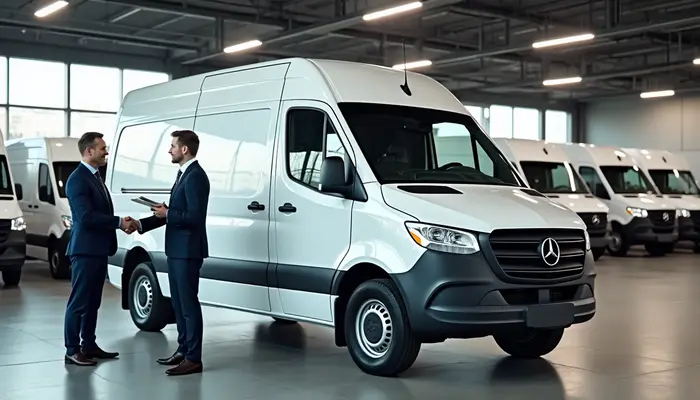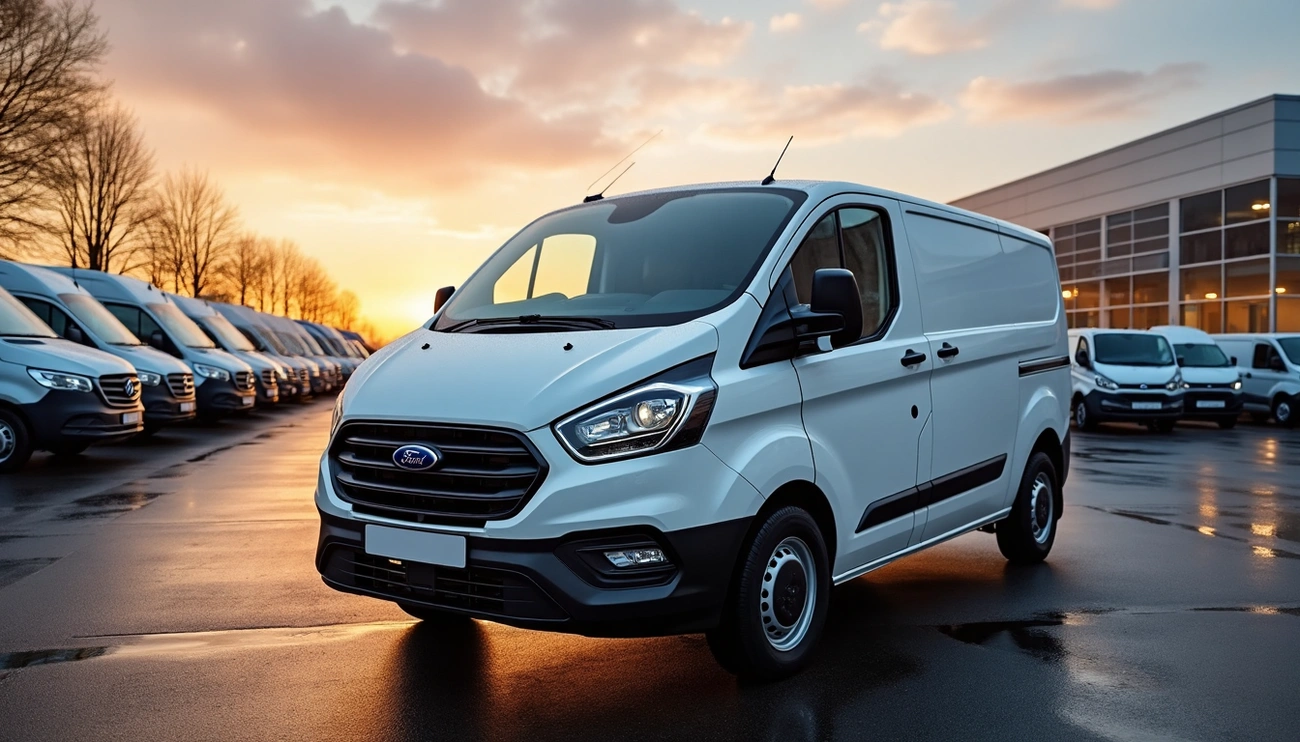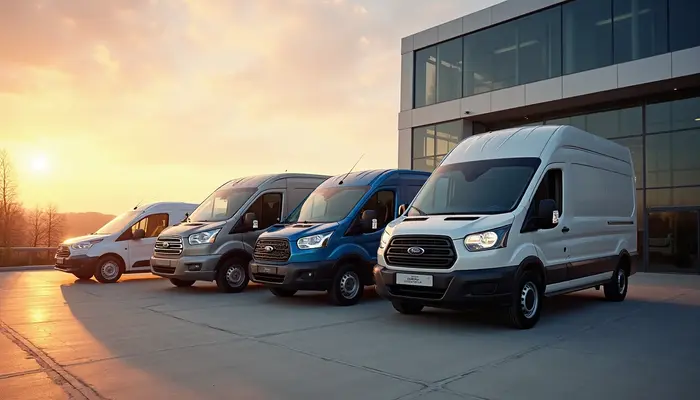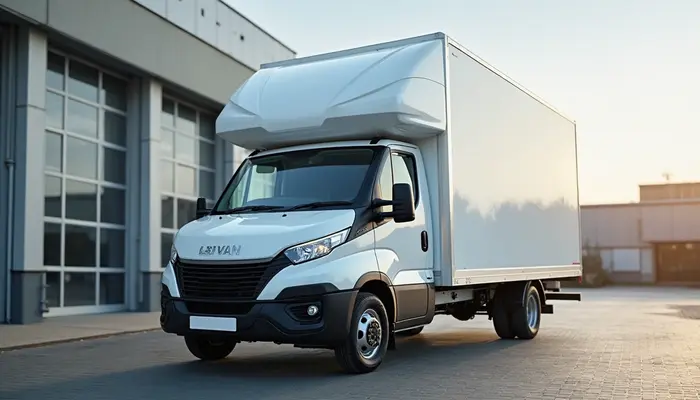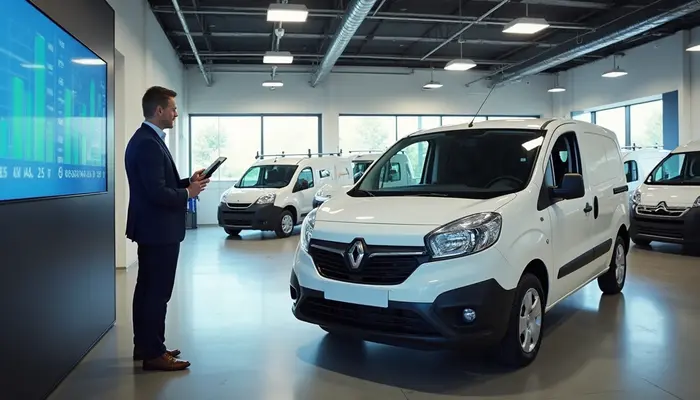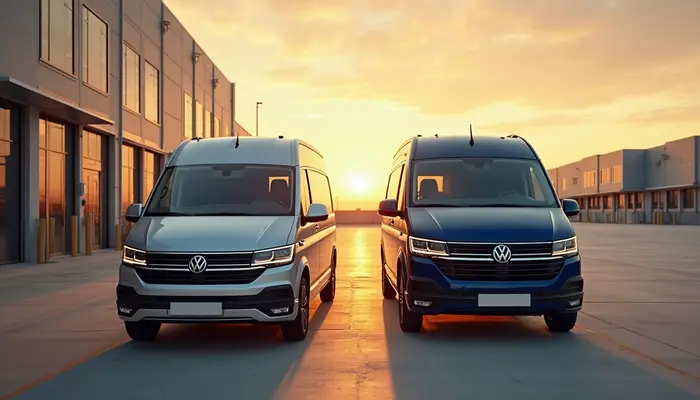Long Term Van Leasing Makes More Sense Than Buying in 2025
The choice between a long-term van lease and outright purchase can be tough. Business operations in 2025 need this decision since it substantially affects the bottom line and operational efficiency. Source
Long-term van leasing proves more advantageous than ownership for many companies. A long-term lease provides steady monthly payments instead of investing capital in a depreciating asset. The lease agreements typically come with maintenance packages that keep vehicles running optimally without unexpected costs.
Let’s get into how van leasing works and why it could be financially smarter than buying. Your business needs careful evaluation of several factors – from tax benefits to depreciation concerns – before making this important decision. See all vans for sale
The Financial Predictability of Long-Term Van Leasing
Financial stability makes or breaks a business. Long term van leasing gives you predictable costs that buying just can’t match. The economic reality of 2025 makes this certainty a game-changer for businesses big and small. See Ford Van Leasing
Fixed monthly payments for easier budgeting
Long term van lease stands out because of its fixed payment structure. You’ll know exactly what you’re paying each month, unlike buying where costs can jump around. This lets you plan your vehicle budget down to the penny and keeps surprises from throwing off your finances. See VW Van leasing
The payments start with a doable upfront rental. Then you make set monthly payments through the lease. You pay only for your agreed lease time, not the van’s full price, so payments stay lower than most financing deals. This setup frees up money you can put back into growing your business.
Let’s look at the numbers. Take a van priced at £23,824.80. If the lender sets a 36-month residual value of £16,677.36, you’ll pay £7,147.44 in depreciation over three years – that’s £198.54 monthly. Add finance charges and taxes to this depreciation cost, and you’ll still pay much less than buying outright.
Electric vans become an option with leasing too. You can save money on road tax, ULEZ charges, and congestion fees. This smart move can lead to big savings down the road.
Avoiding unexpected repair costs
Surprise repairs can blow your budget. But most long term van leasing deals come with maintenance packages that protect you from these costs.
Adding maintenance to your lease gets you:
- MOT coverage for the full agreement (first due after 3 years for new vans)
- Regular servicing on manufacturer schedules
- Essential breakdown cover to keep your drivers moving
- Protection from surprise repair or service costs
Maintenance costs play a big role in your van’s total lease cost. A maintenance contract spreads these costs over your lease term for better planning. Plus, businesses can claim VAT back on maintenance packages, making it even more cost-effective.
This full coverage means you won’t forget about routine maintenance. Your van stays in great shape, with less downtime and better productivity.
Protection from inflation over time
Today’s economy makes inflation protection one of the best parts of how does van leasing work. Your monthly payments stay the same no matter what happens with inflation. The amount you agree to at the start is what you’ll pay until the end.
You lock in your rate when you start the lease. This shields your business from price jumps in the vehicle market during your lease. People who buy outright often face rising maintenance and repair costs as their vehicles get older and parts cost more.
The lease buyout option adds another layer of protection. Your buyout price gets set when you start the lease and can’t change. Sometimes this creates “lease equity” – the gap between residual value and market price. You might end up able to buy the van below market value when the lease ends.
Looking at whether to lease or buy a van, leasing gives you built-in inflation protection. This makes it a smart choice for businesses planning ahead in 2025. While ownership costs can spiral out of control, leasing keeps your expenses predictable so your business can grow steadily.
Access to Newer, More Efficient Vans
Modern van technology moves forward at a rapid pace. Regular fleet updates are vital for businesses that want to stay efficient. A lease a van long term agreement gives you more than just a vehicle—you get access to innovative technology that will boost your business performance.
Stay up to date with the latest models
Long term van leasing gives you the chance to upgrade to new models regularly. Just like getting a new mobile phone for the latest version, van leasing lets you switch to newer vehicles when your contract ends. Your business will always have modern, reliable transportation that shows a professional image.
Van lease long term agreements usually run for 2-5 years. You can return the vehicle and pick another brand new van after this period. This renewal cycle will give a competitive edge to your business with vehicles that match your professional standards.
Leasing lets you access premium vehicles that might cost too much to buy outright. Small businesses find this helpful especially when they have to project a polished image without spending large amounts of capital.
Improved fuel efficiency and lower emissions
Fuel costs make up a big part of business expenses for van operations. With diesel and petrol prices “going through the roof globally”, newer models with better fuel efficiency become more valuable.
Latest vans show big improvements in this area. Manufacturers keep developing more economical engines. New models come with improved fuel efficiency that can cut your operational costs throughout your long term van lease.
On top of that, these vehicles produce lower emissions and help the environment. This green approach reduces your carbon footprint and might qualify your business for tax benefits.
The industry has better testing procedures now. The WLTP (Worldwide Harmonised Light Vehicle Test Procedure) has replaced the older NEDC test to match real-life driving conditions. While exact mpg figures vary, this gives you reliable data to compare different models when you decide to lease or buy a van.
Enhanced safety and tech features
Modern vans pack impressive safety and technological features. Long term van leasing brings these advantages that protect your drivers and business.
Commercial vehicles’ safety technology has taken huge steps forward. Modern vans now include:
- Active Cruise Control that maintains safe distances automatically
- Crosswind Assist that prevents sideways pushing at high speeds
- Autonomous Emergency Braking (AEB) that can detect potential collisions
- Lane Keeping Assist for unintentional lane departures
- Blind Spot Assist that alerts drivers to vehicles in adjacent lanes
Safety impacts could be remarkable according to research. Experts believe that standard AEB fitting on UK vans could prevent up to 2,500 accidents and 350 fatalities each year.
Most commercial vehicles now have touchscreens with DAB radio, USB and Bluetooth connectivity. Drivers can use phones hands-free and stream audio. Apple CarPlay and Android Auto keep your team connected on the move.
How does van leasing work goes beyond just paying for transportation. You invest in the latest safety and productivity technology. This advanced equipment keeps drivers safer and helps them work better, which improves your business operations.
Maintenance and Warranty Benefits
Vehicle maintenance creates major headaches for business owners. A lease a van long term agreement gives you access to complete maintenance and warranty benefits. Your fleet keeps running smoothly without surprise costs or hassles.
Servicing often included in lease packages
Most long term van leasing agreements come with optional maintenance packages bundled into monthly payments. These packages give you a complete care solution that covers all servicing needs throughout your lease.
Complete Care packages deliver everything in one simple, hassle-free bundle – you just need to add fuel. The fixed monthly fee in these maintenance agreements includes:
- All manufacturer’s scheduled servicing
- Replacement of wear and tear items (batteries, exhausts, wiper blades, cam belts)
- Complete breakdown and roadside assistance
- MOT tests when applicable
- Tyre repair or replacement
- Vehicle collection and delivery services at approved garages
The biggest advantage of adding maintenance to your van lease long term agreement turns unpredictable expenses into fixed, budgetable costs. Your monthly amount stays locked at the start of your contract based on your chosen van and mileage limit. This eliminates any financial surprises.
Regular maintenance packages make sure your van receives service according to manufacturer specifications – a requirement to keep your warranty coverage. This routine care helps your vehicle run efficiently and reduces costs over time.
Manufacturer warranty coverage
New vans leased through quality providers include the full manufacturer’s warranty. These warranties cover repairs and replacements for most manufacturing faults. You get peace of mind from day one of your long term van lease.
Manufacturer warranties last between three and five years, though specific coverage periods vary. Maxus and Nissan lead the pack with five-year van warranties as standard. Maxus models come with five years or either 125,000 miles or 60,000 miles of coverage. Nissan provides a five-year or 100,000-mile warranty package.
Your warranty period starts from the vehicle registration date – when your van first gets registered with the DVLA. The manufacturer protects you against material or assembly defects during this time.
Businesses wondering about how does van leasing work regarding extended coverage have options. Many manufacturers let you buy an extended warranty (also called Mechanical Breakdown Insurance) if your lease goes beyond the standard warranty period. This extra protection keeps you covered throughout your lease.
Reduced downtime for your business
Taking commercial vehicles off the road for repairs costs businesses heavily. Replacement hire costs add up quickly. Decreased productivity and potential earnings losses from reduced operations make things worse. Minimising vehicle downtime becomes vital to maintain business continuity.
A lease a van long term with a maintenance package gives you regular servicing that cuts down breakdown risks. Leasing providers work 24/7 to maintain your fleet when vehicles aren’t needed on the road.
Newer leased vans rarely face major mechanical issues. Older vehicles break down more often. Switching to a newer fleet through leasing reduces both maintenance needs and downtime.
Some leasing companies offer services like UPtime Live. This uses telematics data to schedule inspections, servicing, and repairs around your work patterns. It minimises disruption to operations. This proactive approach keeps your van in top condition and maximises productivity.
The choice to lease or buy a van becomes clearer when you think about warranty coverage and included maintenance. Leasing helps your business avoid surprise repair costs while keeping steady cash flow. You can focus on growing your business instead of dealing with vehicle maintenance problems.
Avoiding Depreciation and Resale Hassles
Depreciation acts as a hidden financial drain that businesses often overlook when they buy commercial vehicles. The protection against this unavoidable loss in value stands out as one of the best reasons to lease a van long term instead of buying.
No need to worry about declining vehicle value
The largest cost of owning a van comes from vehicle depreciation. Your new van starts losing value the moment you drive it off the forecourt. The numbers tell a clear story:
- Vans typically lose between 15% and 35% of their value in the first year alone
- After three years, most vans are worth only about 60% of their original value
- The value keeps dropping faster throughout the van’s life
Long term van leasing makes this financial burden disappear completely. You’re just renting the vehicle for a set time instead of watching your asset lose value on your balance sheet. The depreciating asset becomes someone else’s problem once that period ends.
This advantage becomes even more valuable with certain vehicle types that lose value faster, especially when you have electric vehicles with uncertain future values or specialist vehicles with small secondary markets.
Leasing company absorbs depreciation
The leasing company takes on the depreciation risk with a long term van lease, not you. You only pay for the van’s value you use during the lease term, which usually runs 2-4 years.
Here’s a practical example: A van costs £23,824.80 and the lender thinks it will be worth £16,677.36 after 36 months. Your total depreciation cost would be £7,147.44 over three years – just £198.54 monthly. This setup will give a guarantee that you never pay more than the vehicle value you actually use.
Premium brand vans often come with surprisingly affordable lease rates. These vehicles hold their value better, so leasing companies can offer lower monthly payments – they’ll get more money when the van comes back.
Fleet managers find this setup particularly helpful. Long term van leasing makes shared operation of newer, better vehicles possible without the financial weight of asset devaluation.
No stress of selling the van later
One of the best parts about how does van leasing work is avoiding the hassle of selling used vehicles. Selling becomes inevitable when you own a van – a task many business owners try to avoid.
Selling a used commercial vehicle means dealing with:
- Getting the best price (which rarely meets expectations)
- Handling time-wasters and low offers
- Fitting viewings and test drives into your schedule
- Managing paperwork and ownership transfer
- Offering warranties or guarantees
A van lease long term agreement eliminates these problems. You just return the van to the lessor when your lease ends, skipping all the time, effort, and potential costs of selling a used vehicle.
You can still buy the van if it works well for your business needs. Most lease agreements include a purchase option with a price set during initial negotiations that stays fixed throughout the lease. You can choose between keeping the vehicle or switching to a newer model.
The decision to lease or buy a van comes down to transferring depreciation risk and resale responsibility away from your business. This lets you focus on running your business instead of worrying about your fleet’s declining value.
Tax and VAT Advantages for Businesses
Tax and VAT advantages of van leasing provide great financial incentives for businesses in 2025. Knowing about these tax benefits makes a strong case to lease a van long term instead of buying one outright.
Lease payments may be tax-deductible
A key tax advantage of long term van leasing is knowing how to deduct lease payments from your taxable profits. HMRC rules let you treat van lease payments as an allowable business expense. You can subtract these payments from your profits and reduce your tax liability.
Businesses that pay Corporation Tax can benefit greatly from this deduction. Your taxable profits decrease through these deductions, which could save you up to 25% on your van lease long term agreement’s cost.
Your lease type affects the tax treatment:
- Contract Hire leases allow all rental payments as fully tax-deductible expenses in your profit and loss accounts
- Finance Leases let you offset interest charges against annual profits, with the van shown as a fixed asset
Leasing still gives you tax benefits through regular expense deductions, unlike buying a van outright where you’d claim capital allowances based on ownership. Monthly lease costs and interest charges are deductible against your profits, which reduces your corporation tax liability similarly.
Potential to reclaim VAT on business use
Long term van leasing gives VAT-registered businesses extra advantages through VAT reclamation. Your van’s usage determines how much you can reclaim:
- Business-only van use might let you reclaim 100% of the VAT on lease payments
- Mixed business and personal van use typically allows 50% VAT reclamation
HMRC assumes some private usage will happen. It’s worth mentioning that HMRC has strict usage requirements. Your VAT recovery claims might be denied if employees use leased vans for personal trips more than 10% of total mileage.
Good documentation matters here. Many companies use GPS tracking systems to record business use and back up their VAT positions. This evidence shows they follow HMRC’s requirements.
Your long term van lease maintenance package usually lets you reclaim 100% of the VAT on maintenance costs. This extra saving makes leasing arrangements even more cost-effective.
Improved cash flow through tax efficiency
Tax deductions and VAT reclamation work together to create big cash flow advantages for businesses that want to learn about how does van leasing work rather than buying outright.
Leasing needs nowhere near as much upfront capital as purchasing, which helps your business’s cash flow. You keep your money free for other important business investments instead of tying it up in vehicle assets.
Regular lease payments make budgeting easier. These tax-deductible payments lower your regular tax obligations and create steady cash flow benefits throughout your lease.
Lease types affect VAT treatment differently:
- VAT-registered businesses don’t pay VAT on monthly finance payments with Contract Hire leases
- Optional maintenance package service costs let you recover VAT
VAT registered businesses can usually reclaim 50% of the VAT on their lease’s finance element. This immediate tax benefit gives you a clear financial advantage over purchasing.
When you think over whether to lease or buy a van, remember that leasing changes a capital expense into an operational cost. This change often means better tax treatment since you can fully deduct operational expenses in the same year, while capital purchases might need depreciation over time.
These tax efficiencies are the foundations of a strong financial argument for long-term van leasing in 2025. This works especially well for businesses that want to optimise their tax position while keeping operational flexibility.
Flexibility at the End of the Lease
A long term van lease gives you amazing flexibility that buying just can’t match. Your business can adapt to new circumstances without being tied down to old vehicles.
Option to return, renew, or buy the van
Your long term van leasing agreement typically comes with three choices. You can return the vehicle to the leasing company and walk away free and clear. Starting a new lease with a different van makes sense since you can’t renew the exact same one. Some lease types let you buy the vehicle by paying the final balloon payment.
Many leasing companies help businesses that just need more time with their current vehicle. A formal extension creates a new contract lasting 6 or 12 months. An informal extension lets you keep using the van past the contract date without new financial terms. These options give you room to breathe when your business needs change unexpectedly.
Easier upgrades to newer models
How does van leasing work shines when it comes to getting newer models. The process works like upgrading your phone – you pick the latest van and set up a new lease. No more hassles of selling your old vehicle before buying a new one.
Most leasing providers’ key-swap services deliver your new van while collecting the old one. Their careful coordination keeps your business running smoothly during the switch.
Finance Lease arrangements often let you part-exchange for a newer model. You can use any vehicle’s equity toward the deposit on your new van. Your business’s vehicles stay state-of-the-art without major capital investment.
No long-term ownership commitment
The best part of a van lease long term deal? You won’t get stuck with an outdated vehicle that doesn’t fit your business anymore.
This flexibility becomes crucial as your business grows and changes. A van might perfectly match your needs today, but your requirements could change tomorrow. Long-term leasing helps you adapt without getting locked in.
Leasing takes away worries about depreciation that plague vehicle owners. You’ll know your van’s total ‘life cost’ from day one until the end of your agreement. This clarity helps you plan better than ownership, where used vehicle values can swing wildly.
To wrap up, when choosing whether to lease or buy a van, leasing helps keep your business agile and ready for market changes – a great advantage in 2025’s ever-changing business world.
Customisation and Fit-for-Purpose Options
Businesses need vehicles that match their specific operational requirements. A long term van lease gives you more than standard factory setups. Many leasing providers let you reshape a simple van into a valuable business asset through customization.
Choose vans tailored to your industry
Each industry has its own vehicle needs. Leasing companies now offer vehicles designed for specific business sectors instead of generic solutions. Leasing specialists can help you pick the right vehicle from panel, crew, or Luton vans to tippers, dropsides, and utility vehicles that suit your operations.
Temperature control plays a vital role in food transport businesses. Leasing companies provide ambient, refrigerated, or temperature-controlled vehicles that protect your “field to fork” supply chain. The same applies if you work in construction, utilities, education, or other specialised sectors – lease providers can build a fleet that meets your exact needs.
Add racking, refrigeration, or branding
Your van’s interior setup can significantly boost productivity. Most lease companies allow custom shelving or racking systems inside the van, which ranks among the most popular modifications. These storage systems streamline processes by keeping tools and equipment organised and secure.
Your van becomes a moving billboard with external branding. Lease companies usually allow vinyl wraps and decals since they don’t damage the vehicle when removed. This means you can display your business logo and contact details while staying within lease terms.
Popular modifications include:
- Tow bars that add carrying capacity
- Better security with deadlocks and slam locks
- Roof racks to expand storage space
- Refrigeration units to transport perishable goods
Some leases allow mid-term upgrades
Business needs change, so some leasing companies let you modify or upgrade your van during the lease period. These changes require your leasing provider’s approval first.
Permanent modifications might seem tricky, but most leasing companies understand your need to optimise vehicles. Always get permission from your leasing provider before making changes. Removable modifications work best for contract hire agreements since you’ll need to remove them before returning the vehicle.
Customization options differ between providers. Some give access to networks of over 100 conversion specialists who handle everything from basic equipment fitting to complete conversion fit-outs. This flexibility makes long term van leasing an attractive choice for businesses that need specialised vehicles without buying them outright.
Understanding the Terms of a Long-Term Van Lease
Reading the fine print before signing a long term van lease is a vital step. These details might look boring, but they can affect your costs and experience throughout the lease period by a lot.
Mileage limits and how to manage them
Your van lease long term agreement needs an estimated annual mileage figure. This number plays a big role in determining your monthly payments. Leasing companies use these estimates to calculate what your vehicle will be worth when you return it.
Van lease agreements typically come with yearly mileage allowances between 10,000 and 30,000 miles. Leasing companies won’t take back vehicles with more than 180,000 total miles on the clock.
Going over your mileage limit costs extra – usually 10-30 pence for each additional mile. These charges add up fast. The good news is that your mileage allowance covers the whole contract period instead of being split by year. This gives you room to spread out your miles.
Your business needs might change. Some providers let you adjust your mileage cap mid-contract. They’ll decide case by case and might change your payment terms.
Wear and tear expectations
The British Vehicle Rental & Leasing Association (BVRLA) Fair Wear & Tear Guide sets the standard for acceptable vehicle condition at return time. This guide helps separate normal wear from actual damage or neglect.
Your van gets checked twice. First comes a quick look for obvious damage and paperwork check. Later, an independent inspector gives it a full examination to spot any issues beyond normal wear.
Early termination fees and flexibility
Life happens, and you might need to end your long term van leasing agreement early. This is a big deal as it means that hefty penalties will apply. Finance companies usually want 100% of remaining payments if you cancel in year one, dropping to 50% after that.
The early termination process takes three to four weeks. You’ll get separate bills for excess mileage or damage afterward. Some leasing companies are flexible and might offer contract extensions if you’re having real problems. This can turn a tough situation into something more manageable.
Conclusion
The Clear Advantage of Long-Term Van Leasing in 2025
Long term van leasing gives businesses a compelling alternative to outright van ownership in 2025. Fixed monthly payments shield you from unexpected costs. Maintenance packages eliminate repair surprises that often plague vehicle owners. These benefits make financial planning easier and more predictable.
Your business needs modern vans with advanced safety features and better fuel efficiency. This becomes more valuable as vehicle technology evolves faster. The newest models give your business a professional edge and help you stay competitive.
The leasing proposition comes with excellent tax advantages. You can deduct lease payments as business expenses and reclaim VAT. This is a big deal as it means that your overall costs are lower compared to purchasing. You won’t have to worry about depreciation either – a major financial burden for van owners.
Lease agreements offer options that ownership can’t match. When your term ends, you can return the vehicle, start fresh with a newer model, or buy the van outright. These choices are a great way to get the flexibility businesses need in today’s fast-changing environment.
Van lease long term arrangements now come with custom configurations. Providers offer industry-specific vehicles with shelving, refrigeration, or other modifications that match your exact needs. You won’t need the capital commitment that comes with purchasing.
Leasing terms need careful attention, especially when you have mileage limits and wear expectations. Yet the benefits make a strong case for this approach. Most businesses find that long term van leasing fits perfectly with their operational and financial goals in 2025.
Smart business decisions often come down to resource allocation. Leasing turns a depreciating capital expense into a predictable operational cost. This frees up your capital for investments that directly grow your business.
Should you lease or buy a van? The evidence shows leasing as the smarter choice for forward-thinking businesses in 2025.
FAQs
Q1. Is leasing a van more advantageous than purchasing one for businesses in 2025? Leasing a van often provides more benefits for businesses, including lower initial costs, fixed monthly payments, access to newer vehicles with advanced technology, and potential tax advantages. It also offers flexibility at the end of the lease term and frees up capital for other business investments.
Q2. How does van leasing impact a company’s finances compared to buying? Van leasing typically requires lower upfront costs and offers predictable monthly payments, which aids in budgeting. It also allows businesses to avoid depreciation concerns and unexpected repair costs. Additionally, lease payments may be tax-deductible, and VAT-registered businesses can often reclaim VAT on lease payments, improving cash flow.
Q3. What customisation options are available with long-term van leases? Many leasing providers offer extensive customisation options, including industry-specific modifications, racking systems, refrigeration units, and external branding. These allow businesses to tailor vans to their specific operational needs without the long-term commitment of ownership.
Q4. How do mileage limits work in long-term van leasing agreements? Leasing agreements typically include annual mileage allowances, usually ranging from 10,000 to 30,000 miles. Exceeding these limits incurs additional charges, often between 10-30 pence per extra mile. Some providers allow mid-term adjustments to mileage caps if business needs change.
Q5. What happens at the end of a long-term van lease? At the end of a lease, businesses typically have three options: return the van and walk away, start a new lease with a different vehicle, or purchase the van outright if the agreement allows. This flexibility enables companies to adapt to changing needs without being tied to outdated vehicles.

